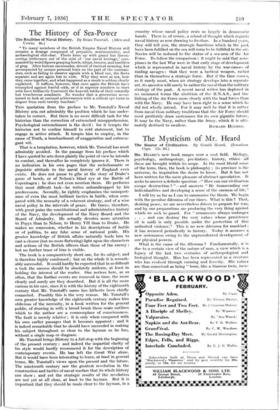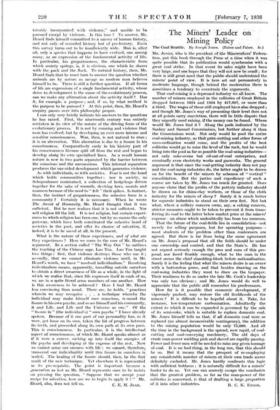The Mysticism of Mr. Heard
MR. HEARD'S new book ranges over a vast field. Biology, psychology, anthropology, pre-history, history, ethics— -all these are brought within its scope. In the most literal sense of the term, then, the book is philosophy ; its province is the universe, its inspiration the desire to know. But it has not been written for the mere pleasure of abstract speculation. It seeks to answer a definite question—" How can our civilisat ion escape destruction ? "—and answers " By transcending our individualities and developing a sense of the oneness of life," I will try as far as I can to summarise the thesis. We begin with the peculiar dilemma of our times. What is this ? That, desiring peace, we are nevertheless driven to prepare for war, and by. our preparations are producing the very thing against which we seek to guard. For " armaments always endanger . . . and can destroy the very values whose persistence (it is said) is only possible under the protection of this unlimited violence." This is no new dilemma for mankind : it has recurred periodically in history. Today it assumes a new seriousness owing to the unprecedented development of our physical powers.
What is the cause of the dilemma ? Fundamentally, it is due to a certain view of the nature of man, a view which is a legacy of the last two centuries of anthropOlogical and biological thought. Man has been represented as a creature who has evolved through cunning and ferocity. His values arc thus conceived as being " born, like a Siamese twin, inex-
tricably incorporated- wth. violence," : and- unable . to be. pursued except by violence. Is this true? To answer, Mr.: Heard finds himself committed =to a survey of human history,: and not .only :of recorded. history but of pre-history.. Even. this survey trans. out to .be insufficiently wide. _Man is, after: all, only -a. species that happens to have evolved,. one aniong many,. as ,anexpression of the fundamental activity of life.- In particular, : his. gregariousness, the :characteristic from: which society-springs„ is, it is obvious,: one which .he. shares. with ..the; pack and . the flock. To natural history, then, Mr.. Heardfinds that he must turn to answer the question whether, animals arc, by .nature as savage as , modern man believes. himself to be. There is still a further question. If all forms. of life are expressions of a single fundamental activity, whose drive ta.development is the cause of the evolutionary process,. can we make any affirmation about the activity itself ? Has, it, for example, a purpose ; and, if so, by what method is. the purpose to_be pursued . At this point, then, Mr. Heard's enquiry:passes over into philosophy proper.
I can only very briefly indicate his answers to the questions he has raised. • First, the nineteenth century was entirely mistaken in its view of the nature of the driving force of the- evolutionary prOoess. • It is not by cunning and violence that man has evolved, but by developing an ever more intense and sensitive -conseiousness. War, then, is not natural to Man ; it is an-aberration. -This aberration is due to a fisiure in his consciousness; -ComParatively early in his hiStOry Part of his consciousness b'eeaine split off from the reSt and began to. develop along its owns specialised lines. AS. a' result human nature. is now in two parts separated by the barrier between the -Conscious= grid the unconscious. This internal separation produces the brie-sided development which generates violence.'
As with indiViduals, so With societies. Fear is not the bond. which • holds' 'communities ' together;.. 'nor is .society,: as Schapenhauer' Maintained, collection of .hedgehogs driven: together for the 'sake of :warnith, devising laWs, morals and• manners because of the need to." .felt "their spikes. Is instinct,- then, the instinct of gregariousness, the cohesive force in a community ? Certainly it. is trieeessary. .. When he wrote The ilicent- of Humanity; Mr.. Heard: thought that it was sufficient. But he now realises that. it is not sufficient. Nor. will religion fill the bill. It is not religion,.but certain experi-- ences to which religion has been one; but by no means the-only. gateway, :which have both constituted the cohesiVe bond of societies in the -past, and offer its chance • of salvation, if, indeed; it is to be saved at all, in the present. - What is the nature of these experiences, and of what are they experiences ? Here we come to the core of Mr. Heard's argument. - In a section called " The Way Out " he outlines the teaching of the Chinese sage; Lao Tzu. Lao Tzu taught two thingi : first, that violence destroys those who use it ; secondly, that we cannot elifninate violence until, in Mr.
Heard's words, we have " resolved individualism." Resolving individualism means, apparently, travelling outside ourselves to obtain a direct awareness of life as a whole, in the light of which we realise that, since life expresses itself in each of us, we are in a quite literal sense members-of-one-another. How is this awareness to be achieved ? Here I find Mr. Heard less convincing than usual. There are, he holds, " practices wherein we may recognise . . . a technique whereby the individual may make himself race conscious, re-mend the fissure in his own psyche, and so see himself and his community, it and Life, and Life and the Universe as one." Of the " fissure in " (the individual's) " own psyche " I have already spoken. Because of it one part of our personality has, as it were, got loose on its own, taken the bit of progress between its teeth, and proceeded along its own path at its own pace.
This is consciousness. In particular, it is the intellectual aspect of consciousness, of which Mr. Heard speaks almost as if it. were a cancer, sucking up into itself the energies of the psyche and developing at the expense of the, rest. Now we cannot sense -otir oneness with-life.; we einnoi; theretore,.
transcend our individuality until this -fiSsure:In -ourselves is healed. The healing of the fissure should, then, lie the first result of the new technique. Yet elsewhere it is repreiented as its pre-requisite. The point is important because a generation as lost as Mr. Heard represents ours to be insists on pressing the question, - " Suppose that we accept your recipe for salvation, how are we to begin to apply it ? " Mr.















































 Previous page
Previous page